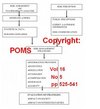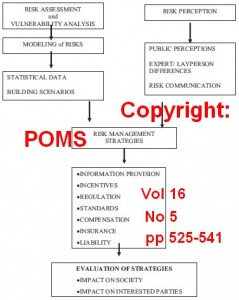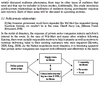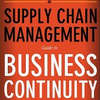 Apparently there must be something really special about Paul Kleindorfer. Otherwise there would be no reason for Morris A Cohen and Howard Kunreuther to write their tribute to him in their 2007 article Operations Risk Management: Overview of Paul Kleindorfer’s Contributions. But what is it that makes Paul Kleindorfer so interesting that it compelled these two authors to write a whole article about him?
Apparently there must be something really special about Paul Kleindorfer. Otherwise there would be no reason for Morris A Cohen and Howard Kunreuther to write their tribute to him in their 2007 article Operations Risk Management: Overview of Paul Kleindorfer’s Contributions. But what is it that makes Paul Kleindorfer so interesting that it compelled these two authors to write a whole article about him?
LP-HC not HP-LC
My first encounter with Paul Kleindorfer was Kleindorfer and van Wassenhove (2004) Managing Risk in Global Supply Chains. And frankly, I was a bit disappointed, as I wrote in my review:
Whereas supply-demand coordination is dealt with in detail, disruption risk only receive a cursory review. Terrorist attacks or changes in regulations are seen as examples of purposeful triggers, and accidental triggers are near misses or on-site accidents like fires or chemical spills. Admittedly, these risk should be of major concern to any company, however, I fail to to see their significance as disruption risks.
Considering the praise of Kleindorfer in today’s article, did I miss something? What I in my ignorance had missed before was that Paul Kleindorfer’s research deals with low-probablity-high-consequence (lp-hc) events mainly, and the day-to-day annoyances and disruptions that I have made the main strand of my research, i.e. hp-lc, have absolutely no place here. And hence, no wonder I was ‘disappointed’ with Kleindorfer, but I have no reason to be, really.
An Annotated Bibliography
The article also features an annotated list of selected papers and book chapters on topics such as:
- Optimal Control Theory
- Planning Horizons for Production Problems
- Production Scheduling
- Decision Sciences
- Peak Load Pricing and Regulatory Economics
- Economics of Postal Service
- Risk Management of Natural Hazards and Catastrophic Risks
- Labor Managed Firms and Incentive Contracting
- Economics of Insurance
- Siting of Facilities
This clearly shows the breadth of Kleindorfer’s impressive line of work, and are ‘only some’ of the topics that have occupied his research attention over his now 45+ years of research.
Risk Management
One of Kleindorfer’s major preoccupations was the development of a risk management framework.
Click image for larger version
Note how (subjective) risk perception is an important part in risk management, alongside (objective) risk assessment and analysis.
A key element that needs to be considered in linking risk assessment, risk perception and risk management are issues of interdependency. Do organizations and their managers invest in security to a degree that is adequate from either a private or social perspective? More specifically, do facilities in a chemical firm have the appropriate economic incentives to undertake risk reducing measures voluntarily that improve their own operations as well as that of the entire organization? Due to issues of interdependency coupled with risk assessment and risk perception problems, the answer to this question is often “No”.
Kleindorfer’s research deals in particular with risk perception in the chemical industry, and a large part of this article portrays how Kleindorfer and his fellow researchers investigated this intrinsically hazardous business.
Risk and reward, not risk management
But suddenly the article takes a different turn than expected. Under the heading Risk Management in the Supply Chain I expected to find a list of the traditional Kleindorfer lp-hc catastrophic and seriously disruptive events and how they could or should be managed. Instead there is a discussion of customer-supplier relationships, and risk-reward tradeoffs, in particular as they relate to contracting and bidding for procurement and after sales service…?!? Right, those are relevant issues in (m)any supply chain(s), and yes, there is certainly a risk attached to them, I do admit that much, but after reading the heading I felt very mislead when I read the text that followed.
Critique?
If you expect this article to be a critique of Kleindorfer’s work, you will be disappointed. It is not. It is, literally speaking, a peer-review of Kleindorfer’s work, done by two of his peers from the Wharton School at the University of Pennsylvania. For what is meant to be a review of
recent work that Kleindorfer and his colleagues at the Wharton Risk Center have undertaken on environmental management and operations, focusing on process safety and and environmental risks in the chemical industry
it is interesting to note that more than half of the references listed in this article are co-written together with Kleindorfer by the reviewing authors themselves. Biased? Perhaps, but not overly so. Selective and maybe a little bit self-promoting? Yes, but it doesn’t make the review any way less valuable.
Conclusion
The article starts out as an article on supply chain risk. So it says in the abstract and the initial sections. At the core of the paper though is not the traditional supply chain risk of catastrophes and damaging events, but supplier-customer relationships and the performance of global supply chains. If you expect to learn more about supply chain risk from this paper, it will disappoint you. If you want to gain a wider perspective on the inner workings of global supply chains, this article is well-worth reading. In fact, it is more than just well-worth. It provides a solid basis for exploring not only Kleindorfer’s work but also that of Cohen and Kunreuther, two scholars hitherto unknown to me, but two scholars I intend to take a closer look at in some of my upcoming reviews.
There is something special about Paul Kleindorfer. I just hadn’t seen it yet.
Reference
Cohen, Morris A, & Kunreuther, Howard (2007). Operations Risk Management: Overview of Paul Kleindorfer’s Contributions Production and Operations Management, 16 (5), 525-541
Download
Author links
- upenn.edu: Paul Kleindorfer
- upenn.edu: Howard Kunreuther
- upenn.edu: Morris A Cohen
Related
- husdal.com: Managing Risk in Global Supply Chains
- husdal.com: Catastrophic Events in Supply Chains













